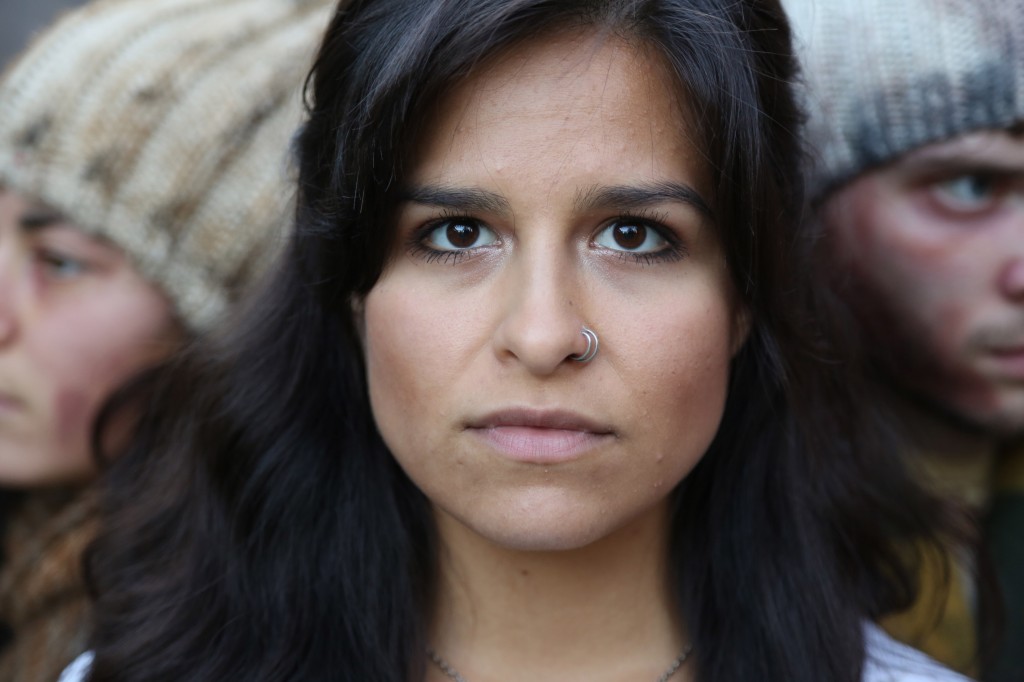
Angelic warfare, mental illness and the disintegration of modern society are the themes of “Marisol,” a disturbing and disorienting play written by José Rivera that pushes the boundaries of conventional theology, biological sex, personal relationships and the pathology of fear and paranoia.
The play, as presented by Southern Oregon University’s Department of Performing Arts at the Center Square Theatre, was directed by actor and director Jackie Apodaca, associate professor of theatre arts at SOU.
The premise of “Marisol” has a very Nietzschean feel to it. God is dying. He is growing old and senile and incapable of maintaining goodness and order in the world. An army of streetwise angels decide enough is enough. They are starting a revolution with the intent of committing deicide, hastening God’s already-languishing demise and thereby restoring order and beauty in the world under their guidance and leadership.
Marisol Perez (Leah Sanginiti), a young, book-smart woman who works in Manhattan as a copy editor for a science publishing company, finds herself caught up in the angelic warfare as it spills over into the grit and grime of the Bronx. Here Marisol lives alone, despite the white-collar status she has achieved in her work. She struggles to keep her sanity in the midst of the dangerous urban environment that is crumbling around her.
But she soon finds sanity a precious commodity when her lifelong guardian angel (Alyssa Rhoney) appears to her for the first time in her dilapidated apartment and informs her that she can no longer protect her and provide the ongoing spiritual comfort that has sustained Marisol throughout her life. The angel must leave to lead the angelic campaign that aims to dethrone and kill the incompetent god, a struggle which throws the human world into complete chaos.
Without the presence of her guardian angel, Marisol is forced to wander alone through an apocalyptic landscape frequented by roving bands of “Nazis” who dispatch undesirables. In this world, the moon has not been visible for months and most food has turned to salt. Marisol encounters a number of lopsided individuals who have also received revelations from their personal guardian angels. One of the most poignant moments in the play is where Marisol starts digging through a trashcan on the street, bringing her down to the level of the homeless masses she struggled to distinguish herself from.
On the surface, “Marisol” does not lend itself to intellectual analysis. Even when looking for comparisons, one comes up short. The play can loosely be described as a meeting of “Taxi Driver” with “John Constantine: Hellblazer,” with a little “V for Vendetta” thrown in. But the play, which is highly original, has a primal feel to it, aiming to awaken a kind of awareness in its viewers of things not usually subjected to linear, structured thought. The play is by turns bizarre and beautiful, aesthetically pleasing and grotesque, witty and sorrowful. Viewers may not know whether to laugh or cry. Viewers looking for a heartwarming story for emotional edification will not find it in “Marisol.”
In terms of production value, “Marisol” is sure to impress, regardless of one’s personal feelings about the subject matter and storyline. The performances are energetic and heartfelt. Sean O’Skea’s scenic design compellingly captures the mood and setting of the story, as does Chris Sackett’s strategic lighting, an excellent example of which is the way the angel’s ominous shadow is cast in large profile on the wall above Marisol when she prays.



